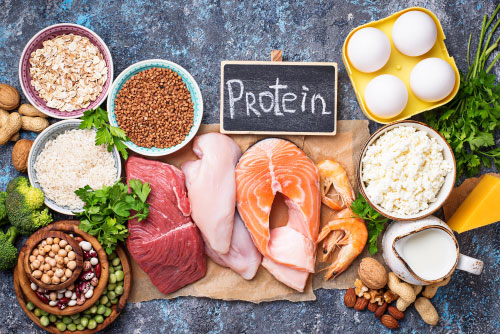
What to Eat After Cervical Spine Surgery?
What to eat after cervical spine surgery May seem complicated, yet if you stick to the basics of healthy eating principles; you’ll find it to not only be easy, but also delicious. Read on to learn more about what to eat after cervical spine surgery and how Neurosurgery & Spine Consultants can help with all of your neck, back, and spine care needs.
Why Diet is So Important Post-Surgery
Diet is crucial to any post-surgery recovery and general health and wellbeing. It’s especially important when you consider how much it can benefit you after cervical spine surgery. Our diets are intrinsically linked to our entire body’s health. Without a proper diet, you run the risk of inviting inflammation, malnourishment, excess weight gain, or even life-altering diseases. With this in mind, why not explore the benefits of a proper diet after you’ve had your cervical spine surgery?
The Right Foods to Eat Post-Surgery
The right foods to eat post-surgery consist of the following food groups:
Quality Protein
A high-quality protein can be the difference between a long recovery or a shorter recovery in many cases. Our bodies need adequate levels of protein to begin the healing and recovery process. Without the right levels of protein being consumed on a daily basis, you’re most likely going to be deficient in your overall protein requirements. This may lead to a delayed recovery time post-surgery and cause you to experience prolonged symptoms associated with a standard surgical recovery. High-quality proteins consist of everything from grass-fed beef, to organic chicken, to even green peas which have some of the highest levels of protein for a vegetable. All in all, you’ll want to consult with a nutritionist or one of our medical staff post-surgery to evaluate if you’re consuming enough protein on a daily basis to support your post-surgery recovery goals.
Organic Vegetables
Organic vegetables are great for incorporating valuable nutrients, vitamins, minerals, and fiber. You’re going to need healthy doses of fiber to promote proper bowel movements, especially if you’ll be recovering in a resting position for extended periods of time. Vegetables have numerous health benefits, yet they’re also a great way to add flavor and juxtaposition between proteins and standard carbohydrates. Treat yourself with a nice plate of steamed broccoli, grilled asparagus, or even some sautéed carrots.
Organic Fruits
Fruits are one of nature’s most delicious, naturally sweet offerings. You don’t need sugary snacks and treats from the grocery store shelf. Choose some of Mother Nature’s best offerings from the tree of health and wellness. Apples, oranges, pears, etc… are all fantastic choices to incorporate into your post-surgery diet. Oranges have bountiful amounts of vitamin C, a vitamin which has been shown to promote accelerated wound healing in patients. Chop up some fruits today and begin to see what they’re all about.
Natural Fiber
Fiber as mentioned above, yet if you’re eating the right foods, you shouldn’t have to supplement with fiber. However, if you’re experiencing constipation post-surgery, you’ll want to discuss with your doctor some of the options which can best resolve said constipation over time. One of the options they may recommend is a natural fiber supplement. These supplements may help you overcome bouts of constipation and be well on your way to having regular bowel movements once again.
Carbohydrates
Carbohydrates provide the body with glucose. This glucose is then converted into regret used to support bodily functions and physical activity. As you can see, carbohydrates are a necessary part of anyone’s healthy diet. Now, the important part to remember is you need to be deriving your carbohydrates from the right sources. These sources of healthy carbohydrates typically come from whole grains, fruits, vegetables, and beans. Treat your body right with these carbohydrates and see the results.
Healthy Fats
Omega-3 fatty acids help your body to reduce inflammation, promote healing, and possibly reduce joint pain if your physical activity is more limited post-surgery. Monounsaturated fats, such as those for km olive oil or avocados, are also great for your overall health and wellbeing. Incorporating these healthy fats into your diet post-surgery can be extremely beneficial to promote a faster recovery and be back on track to returning to a normal life.
Vitamin & Mineral Supplements
Vitamin and mineral supplementation can be a great way to bridge the gap with a lack of vitamins and minerals from our daily diet. Vitamin D, vitamin C, zinc, or even a good multivitamin can be helpful with your recovery efforts.
Adequate Hydration
Staying hydrated throughout the day can aid your recovery efforts. Dehydration causes many problems throughout the body, one of which is benign inflammation. Keeping your body adequately hydrated with high quality water throughout the day, especially if you live in a warmer climate, can be crucial to recovering properly over time.
Choosing Neurosurgery & Spine Consultants for Your Cervical Spine Surgery Needs
Did your last cervical spine surgery not go as well as you had hoped for? If so, you may want to seek out our expertise and we can determine the next best steps going forward. Feel free to contact us if you’re interested in a post-surgical evaluation with your cervical spine surgery, or contact us if you’d like to discuss your various options when it comes to cervical spine surgery here at Neurosurgery & Spine Consultants. We look forward to hearing from you soon!
DISCLAIMER: No content on this site, regardless of date, should ever be used as a substitute for direct medical advice from your doctor or other qualified clinician.